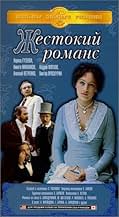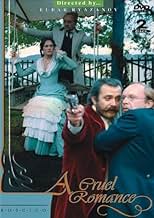Zhestokiy romans
- 1984
- 2 h 22 min
AVALIAÇÃO DA IMDb
7,9/10
4,2 mil
SUA AVALIAÇÃO
Adicionar um enredo no seu idiomaA bitter story about tender love and its cruel betrayal set in Russia of the 19th century.A bitter story about tender love and its cruel betrayal set in Russia of the 19th century.A bitter story about tender love and its cruel betrayal set in Russia of the 19th century.
- Direção
- Roteiristas
- Artistas
Borislav Brondukov
- Ivan
- (as Boryslav Brondukov)
Dmitriy Buzylyov-Kretso
- Ilya
- (as Dmitriy Buzylyov)
Ibragim Bargi
- Kuzmich
- (as I. Bargi)
Vladimir Myshkin
- Ofitser
- (as V. Myshkin)
- …
Vladislav Gostishchev
- Kuzmich
- (as V. Gostishchev)
- Direção
- Roteiristas
- Elenco e equipe completos
- Produção, bilheteria e muito mais no IMDbPro
Avaliações em destaque
Either I don't understand something, or this film is a montage of scenes that have little to do with each other. The plot is unclear, the actors overact, Ryazanov repeats himself. I don't understand what there is to praise, except that Guzeeva is a cutie. What's happening on screen makes you sleepy, each character is more boring than the next, the script seems to have been written under sedation. I wouldn't be surprised that this film has received great reviews in Russia - apparently, only Russian viewers can understand this awesomeness. The drama is untouchable, the humor is dull, watching this in 2025 means not respecting yourself.
I read a comment from one of the readers that he has a difficulty understanding the film from the Western point of view. At least this time the viewer admits having problems with crossing the cultural boundary. Film is not riddled with cliches, it`s theatrical and highly artistic. It should be viewed almost as a poem translated into reality. It doest`n ask from actors just stand there and act natural, it asks for a brilliant, almost satirical work, which is performed in this movie perfectly. Realism is not the goal here. And yet, story like that very well could happened at that time, to the smallest details.
This is my favorite movie, the best drama with plot twists and an unpredictable ending.
It must be said that the film is like a multi-layered pie and it reveals new sides with repeated viewings. To understand it fully, you need to know all the nuances of life in Russia in the 19th century.
The film is based on Ostrovsky's play "The Dowry" written in 1870. There is no need to look for any gender issues or struggle for any rights in it. This is the story of the Ogudalov family, who were left without a source of income after the death of their father. The mother of the family is looking for wealthy husbands for her daughters.
It must be said that the film is like a multi-layered pie and it reveals new sides with repeated viewings. To understand it fully, you need to know all the nuances of life in Russia in the 19th century.
The film is based on Ostrovsky's play "The Dowry" written in 1870. There is no need to look for any gender issues or struggle for any rights in it. This is the story of the Ogudalov family, who were left without a source of income after the death of their father. The mother of the family is looking for wealthy husbands for her daughters.
This film has great music, acting and sets. Overall very good adaptation of the play. I enjoyed it immensely.
The film centers around a young woman who comes from a noble family but has no dowry for suitors. It explores the changing situation in the mid 1800s among the classes. At this time there were 3 classes: the nobles, peasants and the emerging raznochintsy class. Many of the characters in the film are from the latter, and the focus upon wealth and social status is apparent.
In summary, this is a great film which really shows the changing social structures of the 1850s Russia. I would highly recommend this film to anybody interested in romance or Russian history.
The film centers around a young woman who comes from a noble family but has no dowry for suitors. It explores the changing situation in the mid 1800s among the classes. At this time there were 3 classes: the nobles, peasants and the emerging raznochintsy class. Many of the characters in the film are from the latter, and the focus upon wealth and social status is apparent.
In summary, this is a great film which really shows the changing social structures of the 1850s Russia. I would highly recommend this film to anybody interested in romance or Russian history.
This movie by Eldar Ryazanov surpassed my expectations. It really is quite an experience to see how Larissa's life unfolds; how she is coveted by men old and young, rich and poor... And yet every turn of events leaves a much bitter taste on her. It seems like if tears were a permanent mark of every Russian woman, like if, by definition, no woman would dare to call herself Russian without ever tasting the bitterness of life.
Ryazanov is quickly becoming one of my favourite directors. Though here I may be coming late, since he actually achieved fame and glory during Soviet time, a long gone era. Anyway, his "Zhestokij Romans" or "A cruel Romance" tells a tale which seems to me timeless.
Consider the plot of a very beautiful young woman, whose life ahead is full of promise.. But consider also that this girl's life is actually torn apart by events which seem (apparently) out of her immediate control, like if fate was conspiring against her at every other corner. Even her mother, willingly or not, at some point "sells" her -though like every other mother she blindly believes doing what's best for her daughter's future. Zhestokij Romans is sinonimous to drama: just watch the final scene, which is so powerful, telling and poetic...
I especially enjoyed the Gipsy scenes. All that dancing, joy and vodka were very moving in this film. Just as Yugoslav director Emir Kosturica has immortalised the Gipsy people (i.e. "Underground") we also see in "Zhestokij" droves of joyful Gipsies carrying everywhere they go that sound which is at the same time melancholic and joyous. Some other scenes reminded me of "Svadba" (Pavel Lounguine) a film which also features lots of partying and rivers of vodka despite the imminent disgrace and bitterness of life. I even found some parallels with "Luna Papa" another film from the former Soviet republics in which a young and pretty girl has to rapidly mature and leap from childhood into adulthood.
The Gipsy scenes also served as a very effective contrast between joy and doom. While they kept dancing, tragedy was occurring elsewhere. It's like they say: one man's happiness is another man's suffering.
That's why I consider this movie to be "Timeless". That's why I consider the last scene a gem of cinema, like anything I've seen before. Our lovely Larissa is embarked in that permanent quest for real love and affection.
Ryazanov is quickly becoming one of my favourite directors. Though here I may be coming late, since he actually achieved fame and glory during Soviet time, a long gone era. Anyway, his "Zhestokij Romans" or "A cruel Romance" tells a tale which seems to me timeless.
Consider the plot of a very beautiful young woman, whose life ahead is full of promise.. But consider also that this girl's life is actually torn apart by events which seem (apparently) out of her immediate control, like if fate was conspiring against her at every other corner. Even her mother, willingly or not, at some point "sells" her -though like every other mother she blindly believes doing what's best for her daughter's future. Zhestokij Romans is sinonimous to drama: just watch the final scene, which is so powerful, telling and poetic...
I especially enjoyed the Gipsy scenes. All that dancing, joy and vodka were very moving in this film. Just as Yugoslav director Emir Kosturica has immortalised the Gipsy people (i.e. "Underground") we also see in "Zhestokij" droves of joyful Gipsies carrying everywhere they go that sound which is at the same time melancholic and joyous. Some other scenes reminded me of "Svadba" (Pavel Lounguine) a film which also features lots of partying and rivers of vodka despite the imminent disgrace and bitterness of life. I even found some parallels with "Luna Papa" another film from the former Soviet republics in which a young and pretty girl has to rapidly mature and leap from childhood into adulthood.
The Gipsy scenes also served as a very effective contrast between joy and doom. While they kept dancing, tragedy was occurring elsewhere. It's like they say: one man's happiness is another man's suffering.
That's why I consider this movie to be "Timeless". That's why I consider the last scene a gem of cinema, like anything I've seen before. Our lovely Larissa is embarked in that permanent quest for real love and affection.
Você sabia?
- CuriosidadesLarisa Guzeeva's debut.
- ConexõesFeatured in Muzyka zhizni (2009)
Principais escolhas
Faça login para avaliar e ver a lista de recomendações personalizadas
- How long is A Cruel Romance?Fornecido pela Alexa
Detalhes
Contribua para esta página
Sugerir uma alteração ou adicionar conteúdo ausente

Principal brecha
By what name was Zhestokiy romans (1984) officially released in Canada in English?
Responda


































